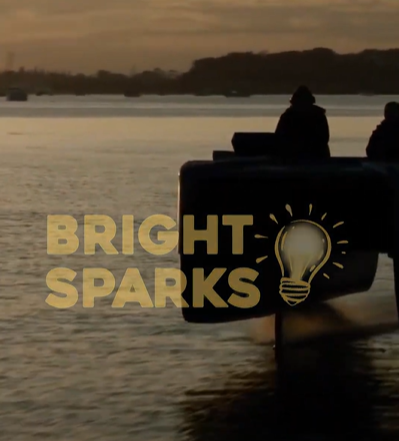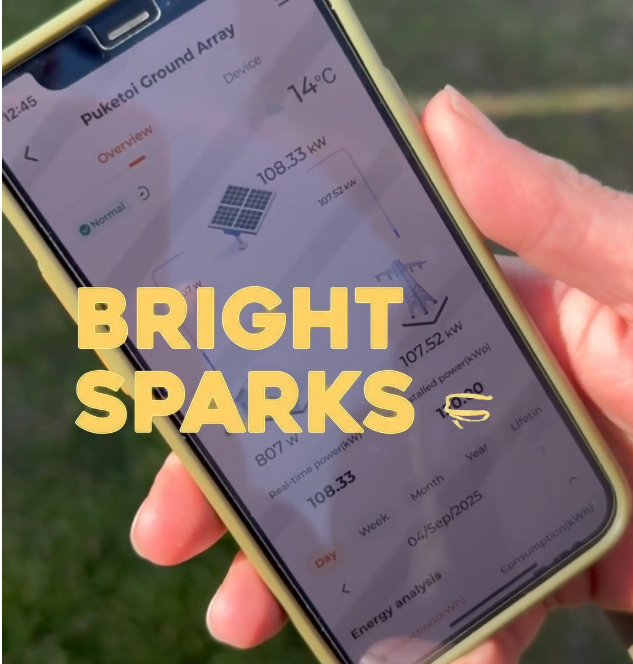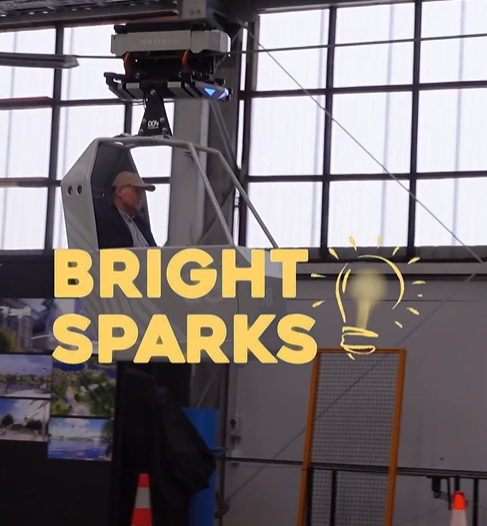News & Updates


Andrea Vance digs into the big infrastructure deficit faced by Queenstown as it deals with rapid growth - and Rewiring Aotearoa's Josh Ellison explains how the ambitious Queenstown Electrification Accelerator will help address the region's energy concerns and turn it into the world's most electric destination.


Auckland CBD's biggest solar install shows that existing rooftops - big and small - are an easy win for electricity generation; New Zealand researchers leading the world on solar efficiency; a clever scheme to train up more heat pump installers in the UK; a very early example of loadshifting; and electric school buses hit the road in the US.


Fairly compensating households, farmers, and businesses with solar and batteries that export power at peak will give customers a better deal and give a much needed jolt to a market that has been slow to innovate and make the most of new technology.


Gas, batteries and emissions are discussed on RNZ's First Up - and we have some thoughts.


For Jack Tame, the question of going solar is not if, but when. As he said on his Newstalk ZB show after confronting a big electricity bill, "there are only so many gains to be won from policing light switches and shower times. I’m seriously wondering about solar ... The huge surge in solar is being driven by economics. Put simply, solar power is way, way, way cheaper than other forms of electricity generation. Between batteries and solar panels, the technology is only getting better and only getting cheaper."

Solar smashes a few records and helps the world get off gas and coal; homes, not power plants, are the key to lower power prices; 24 new bus chargers are installed in one day in Auckland; DARPA makes some very special popcorn by beaming energy wirelessly for 8km; and an astronomer discovers an addictive new star gazing app.


We know that going electric can help reduce household bills, but the upfront costs are still a big barrier for many. Getting past that requires access to finance and that's now closer than ever.


Rewiring Aotearoa's submission highlights that successful digitalisation should allow customers to maximise benefits from their provision of demand flexibility and solar and battery exports, without third parties (aggregators or VPPs) routinely taking a cut of the value. Retail offerings that include time of use prices and fair export tariffs will be key enablers of successful digitalisation of the electricity system. Customers need a fair deal through their electricity prices and export tariffs. This means the customers need to have the option to choose from a range of retail tariffs that include time of use prices, fair export tariffs (that reflect the value in the wholesale market) and symmetrical export tariffs from distributors.


'The neighbourhood effect' is a powerful force when it comes to influencing purchasing decisions. And that's why Bright Sparks like Stephen Drew are so crucial because they can give community members the knowledge and confidence they need to explore these cheaper, cleaner electric options for themselves.


Redwood Materials claims a record with old EV batteries used to store cheap solar to run a small data centre; OneEnergy launches a product that puts the sun directly into your water tank; more plug-in solar news from Ikea and Utah; very fast electric boats and cars; and a beautiful union between two star-crossed lovers.


While we like to talk about the economic, environmental and resilience benefits of using more electricity, there’s no denying that the news is dominated by stories about increasing electricity prices.


Evnex has established itself in New Zealand, and it's starting to plug in to the Australian market. Founder and CEO Ed Harvey and commercial & technical account manager Tony Davis take us for a tour of the Christchurch office where they assemble and test their smart chargers.


Rewiring Aotearoa's Queenstown Electrification Accelerator is on a mission to create the lowest bills, lowest emissions and highest resilience for the region, and make it easy for homes and businesses to go electric. And it just got a big boost after receiving $220,000 from the Central Lakes Trust.


On The Detail podcast, Sharon Brettkelly talks to Consumer's Paul Fuge about dwindling gas reserves, rising prices and why relying on new gas discoveries is a mug's game.


Victoria looks to get off the residential gas with a range of changes, an announcement in the UK gets everyone excited about V2X, why EVs are a good hedge against geopolitical strife, new comparison and switching partner announced (and we have a couple of requests), and it turns out that keeping the emissions out of the sky is a better idea than trying to catch them.


Rewiring Aotearoa is extremely supportive of the focus the Electricity Authority is putting into exploring opportunities and seeking views on a more ‘decentralised’ electricity system. It’s great to see the release of the Green Paper seeking views from New Zealanders on the role they can play in the future electricity system and how a more decentralised electricity system should evolve. As the Green Paper explains New Zealanders will benefit from a more decentralised, community-centric energy system through lower energy bills, greater energy resilience, fuel security and lower emissions. However there are some assumptions and emphasis in the Green Paper that we think needs to change


Rural Roundup's Andy Thompson talks to Mike Casey, a keynote speaker at the Primary Industries Summit, about the country's energy system and the growing appetite for solar among farmers.


More strong signals from the Government that it's focusing on lowering bills and embracing solar as projects in Rakiura / Stewart Island, Bay of Plenty and Hawke's Bay get loans of up to $28.1 million combined. "Solar power is playing an increasingly important role in increasing electricity generation in New Zealand. It will help us reach our renewable energy targets and bolster the security and affordability of our energy supply,” says Energy Minister Simon Watts.


An indepth study by EECA that aimed to show "where and under what conditions does investing in solar PV make sense?” has shown that rooftop solar "is likely to be financially viable for a significant proportion of New Zealand households, particularly for those who consume a lot of energy".


Rewiring Aotearoa's research has shown that rooftop solar is the cheapest delivered electricity available to New Zealand households, and a new in-depth study by the Energy Efficiency and Conservation Authority (EECA) has backed that up. "Solar panels now stack up financially for many households in all three of the country's biggest cities, as well as Queenstown ... plunging panel prices and rising electricity bills have tipped the scales in favour of rooftop solar for many homeowners."


Rewiring Aotearoa is supportive of the Innovation and non-traditional solutions allowance (INTSA) and the development of Guidance for submissions. Read our full submission by downloading the document.

Solar and batteries - in homes and EVs - offer signicant resilience benefits during times of crisis and the Ratepayer Assistance Scheme can help unlock private investment.
Read moreShareable linkDownload
Electrification is the single biggest opportunity to improve fuel security in New Zealand and that's why we think we need a bold national energy independence plan, not just more incremental changes to our current fuel security plan.
Read moreShareable linkDownload
Unmanaged EV charging that occurs at network and system peaks could add unnecessary electricity infrastructure investment, increasing bills for all customers. Investment in our networks is scaled to meet peak demands and has the potential to significantly increase electricity bills over the coming decades. It is important we take action to shift demand, where it makes sense, to avoid peak demand increases. Rewiring Aotearoa is very supportive of the efforts the Ministry of Business Innovation and Employment is taking to consider options to deliver a more flexible electricity system that will lower system costs for all consumers. Uptake of smart EV chargers is one way to manage peak EV demand and support a lower system cost. However we do not think there is a strong enough case to mandate that all fixed EV charging units sold in New Zealand must be smart.
Read moreShareable linkDownload
Rewiring Aotearoa supports the proposed changes to Multiple Trading Relationships (MTR) (allowing two traders – distributed generation and consumption), which will increase consumer choice and introduce more competition to retail tariffs. For example, it will disincentivise tariffs that offer competitive export tariffs, but also ramp up consumption tariffs. The Electricity Authority should also implement changes at this time that require retailers to allow large sites to share solar across multiple co-located installation control points (ICPs, i.e. ICP aggregation), and facilitate peer to peer trading for small scale renewable generators with local sites. Rewiring Aotearoa disagrees that delaying these steps via a staged approach is in consumers best interest. Consumers should not have to wait until demand increases to unlock the benefits of their solar and battery systems or access more competitive options from retailers. This should be supported now, to help consumers make investment and retail tariff decisions that reduce their overall energy bills.
Read moreShareable linkDownload
We appreciate that broader resource management reform is underway that will ultimately provide a more consistent national framework. However, we cannot afford to wait for the perfect system while workable solutions are delayed. In the meantime, inconsistent and unnecessary consenting requirements for small-scale ground-mounted solar are slowing down projects that could deliver immediate benefits - lowering energy costs, strengthening resilience, and supporting the grid. While long-term reform is important, immediate adjustments will ensure small-scale solar isn’t held back by outdated or inconsistent rules.
Read moreShareable linkDownload
"Investing in natural gas in homes doesn’t make economic sense anymore for New Zealanders ... Rewiring Aotearoa’s view is that the Government should support a managed transition away from natural gas for the homes and non-industrial businesses connected to reticulated natural gas distribution networks. This would help address inequity for households on low incomes and renters, and provide greater certainty over how quickly customers will disconnect, when networks would likely retire and cost recovery timelines."
Read moreShareable linkDownload
Rewiring Aotearoa's submission highlights that successful digitalisation should allow customers to maximise benefits from their provision of demand flexibility and solar and battery exports, without third parties (aggregators or VPPs) routinely taking a cut of the value. Retail offerings that include time of use prices and fair export tariffs will be key enablers of successful digitalisation of the electricity system. Customers need a fair deal through their electricity prices and export tariffs. This means the customers need to have the option to choose from a range of retail tariffs that include time of use prices, fair export tariffs (that reflect the value in the wholesale market) and symmetrical export tariffs from distributors.
Read moreShareable linkDownload
Rewiring Aotearoa is extremely supportive of the focus the Electricity Authority is putting into exploring opportunities and seeking views on a more ‘decentralised’ electricity system. It’s great to see the release of the Green Paper seeking views from New Zealanders on the role they can play in the future electricity system and how a more decentralised electricity system should evolve. As the Green Paper explains New Zealanders will benefit from a more decentralised, community-centric energy system through lower energy bills, greater energy resilience, fuel security and lower emissions. However there are some assumptions and emphasis in the Green Paper that we think needs to change
Read moreShareable linkDownload
Rewiring Aotearoa is supportive of the Innovation and non-traditional solutions allowance (INTSA) and the development of Guidance for submissions. Read our full submission by downloading the document.
Read moreShareable linkDownload
While the potential implications of the Bill are wide-ranging, our submission has focused on the potential implications for the electrification of Aotearoa NZ if the Bill is enacted as proposed. This is pertinent to Rewiring’s work, because one of our core aims is to help reduce energy bills for customers - NZ’s households, farms, and businesses. Significant changes are needed to fix the status quo, and we are concerned that the Bill may inadvertently bake in the existing rules governing the sector.
Read moreShareable linkDownload
Rewiring Aotearoa is supportive of the development of Publicly Available Specification for Residential solar photovoltaic (PV) and battery storage systems guidelines. These guidelines can provide a consolidated and trusted source of information to help households navigate the process of choosing and installing solar PV and batteries. There is some messaging and information in the PAS that we think needs to be changed or added to provide households with the best advice to support them to maximise benefits from solar PV and batteries. This includes removing the focus on pay back periods and informing households about cost savings from day one from solar PV and batteries financed over the life of the system. Households also need information about the potential risks of some existing lease to own sales models which provide little real benefit to households with the bulk of the savings captured in suppliers profits. Download the document to read our full submission.
Read moreShareable linkDownload
In a cross-submission, Rewiring Aotearoa has responded to a range of concerns raised by other submitters in the Energy Competition Task Force's consulation.
Read moreShareable linkDownload
We support the role that government procurement can play in benefitting every community across the motu. We agree that simplifying and streamlining the procurement process is important, and reducing rules is a logical starting point. However, this should not undermine key considerations and past efforts in ensuring government spending supports long-term positive outcomes. Government procurement can support us to go for growth by increasing productivity of energy, which is a fundamental economic input
Read moreShareable linkDownload
Overall, Rewiring Aotearoa welcomes the objectives of this package of proposals. from the Energy Competition Task Force. We view the package as a critical step in improving energy system outcomes for all consumers. We consider retailers paying consumers fairly as a critical step, and we are mostly satisfied with the Task Force’s approach to this (initiative 2C) and think it will create better outcomes for New Zealand consumers and the energy system as a whole. In contrast, the Task Force’s preferred option around how distributors are required to reward peak input from consumers (initiative 2A) will not in our view meet the Task Force’s (or the Electricity Authority’s) stated objectives.
Read moreShareable linkDownload
Focusing on the emissions reductions at home through electrification is a major opportunity (and challenge) for Aotearoa NZ. Homes, farms, and businesses must play a role in driving emissions reductions through electrification and the potential must be recognised and addressed to our 2035 international climate change target.
Read moreShareable linkDownload
Rewiring Aotearoa believes we need to make better use of our existing infrastrucuture, see customers as an essential part of a 21st Century energy system and that electrification will lead to much greater energy security and resilience.
Read moreShareable linkDownload
Rewiring Aotearoa's submission to the Electricity Authority on its Network Connections Project - Stage One is in and it is good to see the Authority practicing its statutory objective of protecting the interests of consumers.
Read moreShareable linkDownload
The Ministry for Business, Innovation and Employment opened consultation on a discussion document about amendments to the Electricity Safety Regulations to expand the permitted voltage range for electricity supply. Rewiring Aotearoa's submission believes changes are needed to prepare for the rapid adoption of customer energy resources, and electricity distribution companies need to be compelled to allow export limits to be increased.
Read moreShareable linkDownload
The Department for Prime Minister and Cabinet and the Ministry for the Environment proposed a topic for a Long Term Insights Briefing entitled 'Everyone plays a part: building New Zealand’s resilience in the context of global trends and our unique natural environment'. Rewiring Aotearoa's submission says energy security and resilience, critical infrastructure failing and commodity/energy price shocks are especially important for Aotearoa NZ’s resilience to future challenges, and farms can also play an important role.
Read moreShareable linkDownload
Our ERP2 submission outlines what we think needs to be done to improve the Government's plan to reach our climate targets, electrify the Aotearoa New Zealand economy and build a fairer future energy system for New Zealanders that saves people money and does not leave anyone behind.
Read moreShareable linkDownload
There is a relevant saying: ‘Information wants to be free’. While the proposed Consumer and Data Product Bill takes a step in that direction, it does not offer the level of freedom that could be technically accomplished, nor the level of freedom that is likely to unlock the maximum level of innovation.
Read moreShareable linkDownload
Rakiura / Stewart Island faces the highest electricity prices in New Zealand. Successive governments have funded report after report and numerous fly-in visits by Ministers have failed to change this situation for the local community. Rewiring Aotearoa believes the opportunity is to harness existing solar and battery technology to deliver significant cost-of-living savings and reduced emissions at scale via electrification on Stewart Island right now. With financed solar and batteries, electricity usage costs for residents could be halved without delay. Rewiring Aotearoa has been engaging with the local community, who have been sending us their power bills. On Saturday 27th April some of the Rewiring team visited Stewart Island (including Mike Rewi who has strong whakapapa to Stewart Island). What we are hearing from this community is many locals fear the proposals and the likely “preferred option” will be focused on replacing current diesel generators, not on reducing the cost of energy for consumers. Our proposal outlines Rewiring Aotearoa’s pitch for an alternative approach to develop a community-led energy solution for the Island.
Read moreShareable linkDownload
Overall, we encourage the Commission to think beyond competition merely as a driver for innovation, to consider the outcomes from innovation for the long term benefit for New Zealanders. Rewiring Aotearoa believes one such outcome from market innovation is supporting the electrification opportunity for Aotearoa New Zealand. The Commission has the opportunity to play an active role in driving this not just through the energy market, but also through the personal banking market. It is important that these functions are not seen in isolation, but as a system, to better realise the Commission's role in delivering on NZ’s emissions reduction plan, and 2050 Nationally Determined Contribution.
Read moreShareable linkDownload
18 March 2024: New Zealand is one of the first places in the world where electric appliances and vehicles are now more affordable than their fossil fuel equivalents. A new report has shown that, on average, homes currently using gas appliances and petrol vehicles could save thousands every year if they went electric and got their electricity from a combination of rooftop solar, home battery and New Zealand’s already highly renewable grid.
Read moreShareable linkDownload
In this future, consumer infrastructure needs to compete on a level playing field with traditional infrastructure – if a $10,000 battery on a consumer’s premises can provide the same service as a $20,000 supply-side asset (a network or generation investment), the consumer’s asset should be selected for the service. However, today there is a systemic bias towards traditional infrastructure largely because it is seen as significantly more ‘dependable’. There are a variety of historical reasons for this. Our primary context to this submission is that many of the assumptions and rationale for this bias are quickly falling away, and DPP4 provides a significant opportunity for the Commerce Commission (the Commission) to reset the assumptions and correct some of this bias.
Read moreShareable linkDownload
The EA has the ability to take a leadership role in the energy transition on behalf of electricity consumers. Far more than the Commerce Commission’s oversight of EDBs investment plans, the EA’s network pricing workplan gives consumers agency in the development of the electricity system. When consumer agency is stifled, they will likely have significantly worse financial outcomes on their bills. Much of the necessary changes have been demonstrated already locally or overseas, and the remaining question is not if the changes are possible but if we as a nation will have the courage to implement them on the timeline required to drive better energy transition outcomes for consumers.
Read moreShareable linkDownloadWe need gas in the short term to generate electricity and for certain industries to keep operating, but gas is expensive, it is likely to get more expensive, and it is running out faster than expected. So how do we use it now? How are shortages and price rises impacting homes and businesses? And what can we replace it with?
Read moreWe need great urban design that encourages electric public and active transport for safe neighbourhoods and healthy lifestyles, but we also need electric cars for rapid decarbonisation and to address all the vehicle travel we realistically aren’t going to shift or avoid. These two things can be complementary.
Read moreWhen it comes to our energy system, we could do the bare minimum and pay the price, or we could think ahead and reap the rewards. Here's what both of those options could look like in 2030.
Read moreYou will always have to pay for an energy subscription. Using renewable electricity in electric machines (and ideally running on the sun) is the cheapest energy subscription you can get. Here's how the numbers stack up.
Read morePlenty of people need cars (and plenty of people still want them), and other vehicles are literal engines of prosperity. We don't have to give them up to reach our climate goals. We just need them to be electric.
Read moreSolar on our rooftops, farms and businesses can displace the emissions generated by burning fossil fuels in our homes and especially our cars, provide the extra electricity we need to run our electric machines, help bring the cost of electricity down for everyone on the network, and improve our energy security by keeping water in our hydro lakes for when we need it most.
Read moreWe often hear from people who aren’t sure if switching to an electric alternative is the right move. One of the most common questions we get asked is ‘will switching to an electric machine actually reduce my carbon footprint if creating the new machine or materials produces emissions?’It’s a fair question, and we completely agree it’s important to think about the full life cycle of the products we buy and use. Electric alternatives, including vehicles, often produce more emissions than fossil fuel equivalents during manufacturing. But, over the lifetime of the machine, they create much less carbon pollution because they don't burn any fuel.
Read moreFossil fuels for homes, transport and industrial processes make up the vast majority of the country’s total energy consumption. Electrifying the machines that use these fossil fuels means we will use more electricity but much less energy overall.
Read moreAn electrified energy system is actually full of opportunities for redesign, reuse, recovery and recycling. There are opportunities for innovators and entrepreneurs to generate value across the lifespan of every energy asset, not least the return of its components to the manufacturing cycle. To explore this further, Rewiring Aotearoa has partnered with Circularity, local experts in circular design and strategy, to explain what the circular economy is, how to integrate circularity into the design of energy systems, and the role of policy strategy to make it happen.
Read moreThere are no free lunches in energy. But some lunches are far, far cheaper than others. Electrifying everything will massively reduce the overall material and energy requirements of the global energy system. This can be said with high confidence. To be sure, renewable energy systems take materials and energy to build. But this is dwarfed by the mind-boggling scale of extraction, consumption and wastefulness of fossil energy.
Read morePeople sometimes talk about ‘carbon tunnel vision’ – that is, the single-minded pursuit of emission reductions at the sake of everything else. But this is the wrong way to think about electrification. It isn’t only about emissions (even though preventing the world from dangerous overheating is quite the co-benefit). It isn’t only about the tech or the kit: the rooftop solar panels, the batteries, the electrified appliances and vehicles. These are just the means to an end. Electrification is about people and it is a fundamentally better way to power our lives and livelihoods.
Read more

2025 is off to an electric start, as BYD announces a big price drop for some models in Australia (and the country hits record EV sales in 2024), Kia goes electric for the Australian Open , Rafa does some electric surfing, and Mike Casey tows tonnes of electric cherries with his EV9, new research from Massey and Lincoln looks at the win-win of combining solar panels and agriculture, and why pay for an expensive, unpredictable fossil fuel subscription when you could lock in the savings (and emissions reductions) of going electric.
Read more

Charge your glasses for the last Electic Avenue of the year, with research from Australia showing areas with higher unemployment rates are more likely to seek out the cost savings and bill certainty of solar, residents of Thames protesting about high petrol prices are reminded that electricity is the cheapest fuel and rooftop solar is the cheapest electricity, the first Windrose electric truck has landed in New Zealand and the efficiency of electricity smashes the other options, why tradies will be the heroes of the energy transition (and have a big role to play in terms of recommendations) and a clever induction stove that doesn't require any wiring changes.
Read more

Using heatpumps instead of fossil fuels is shown to save lives and money, Powerco's plea to its gas customers that they avoid reality, Paddy Gower visits a zero energy bills home, EV charging sees the light and takes to the streets, and the Popemobile plugs in.
Read more

Lots of electric gifts under the tree this week as batteries keep getting cheaper, hydrogen still not the solution for light transport, cutting carbon with electric lawnmowers, how electric wallpaper can help get homes off gas, and solar powered hats, candy floss, festivals and maybe even movies.
Read more

The electric bandwagon is speeding up, as EECA launches a clever cost-saving campaign showcasing the benefits of electric homes, Octopus opens the doors of New Zealand's first zero energy bills home this weekend, the silent solar revolution is spreading through the developed world, a glorious graph that shows energy economics winning over politics, Ford's new EV ute shows its towing prowess, and Mike Casey embraces his inner electric bogan.
Read more

A big week in the long-running battle to turn EVs into batteries on wheels, researchers prove that using cheap solar during the day to heat the water is a good idea for customers and the grid, a solar map of New Zealand that offers lot more detail, tiny turbines (and tiny homes inside massive turbines) and a flood resistant EV.
Read more

We're sparking joy this week with Saul Griffith's electric solar powered scooter, Australia and Texas hit major solar milestones, Coldplay creates a truly electric atmosphere, Mike Hosking's EV queries answered with a graph, Kia's new concept car, and Counties Energy teaches kids about solar by taking the grand prix to school.
Read more

A bumper crop of electric goodies this week, with Douglas Park school in Wairarapa impressing with its solar, a rare bright spot for the climate as the world continues to run on the sun, UC researchers get funding to push perovskite, the world's most sustainable snowmobile, an EV expo in Christchurch and a true electric tinkerer.
Read more

We're in the business of changing perspectives at Rewiring Aotearoa and this week's Electric Avenue is a doozy, with Octopus Energy showing that customers will change their behaviour if there's money to be made, Australian coal miners drive a Tesla and have their minds blown/changed, an engine lover's break up letter with diesel boats after experiencing Vessev's VS-9, the IEA's latest report offers a revealing comparison, the story of the 'genius solar plane that can fly forever', Rainn Wilson pleads with the powers that be to heed his warnings, and ad network Ogilvy gets a fossil fuel flogging.
Read more

Put your tongue on that battery, folks, because there's a groundbreaking pilot project in Australia that offers a glimpse at an electric future, a Wairarapa marae with solar and batteries is helping improve resilience after emergencies, solar farms are proving resilient to major weather events, fossil fuel gardening gear is getting the chop, golf courses are going electric and there's another beautiful electric caravan to drool over.
Read more

Trent Yeo, the founder of Ziptrek Ecotours, is a big supporter of his region's goal to become the world's most electric destination, a vision being brought to life by the Queenstown Electrification Accelerator. And he walks the talk with his own low-impact business and his highly efficient all-electric home.
Read more

While the vast majority of EV charging happens at home, reliable public charging infrastructure is essential for those who don't have that option and for those occasional longer trips. ChargeNet, which just celebrated its tenth birthday, has been there from the start and, whether it's the 50kW workhorse of the early days or the 300kW beast of today, the company has helped more New Zealanders drive on locally-made electrons rather than foreign fossil fuel molecules.
Read more

Vessev has been turning heads with its beautiful electric hydrofoiling boats in New Zealand and it will soon be turning heads in Northern Ireland as it has just received its first international order for an 11-person VS-9 from an eco tourism resort.
Read more

The Crutchley family has been turning sunlight into food and fibre on their Maniototo farm since 1939. Now, Emma Crutchley and Kyle Hagen are turning sunlight into energy.
Read more

Queenstown's roads are regularly clogged and, as the region continues to grow, that's only going to get worse. But Whoosh thinks the solution could be right above our heads.
Read more

The idea of sharing excess energy with your community has long been a dream of solar and battery enthusiasts and that idea is starting to blossom. Microgrids have been proven to work in remote Australian regions; some marae in New Zealand are helping to reduce bills for people in their communities; Kāinga Ora has successfully tested the concept of solar sharing in social housing; and Bright Spark Tama Toki is attempting to bring the idea to life on his home island of Aotea / Great Barrier.
Read more

There are plenty of clever cookies working on electric innovations across the motu and there aren't many cleverer than Garry Peek, the main brains behind Peek Robotics.
Read more

For households, upgrading to an electric vehicle is likely to save you money over the long term (and the proposed RUCs scheme will make EVs even more economically appealing). It is also likely to have the biggest impact on your emissions. Similar benefits apply to businesses and it makes increasingly good sense as more electric machines become available and the upfront costs drop further. All these electric machines set to be put to use in New Zealand will increase demand for electricity and put pressure on our existing network. And that's where a company like Thundergrid comes in.
Read more

David Gatward-Ferguson realised early that electric vehicles were a good fit for his tour business, Nomad Safaris.
Read more


